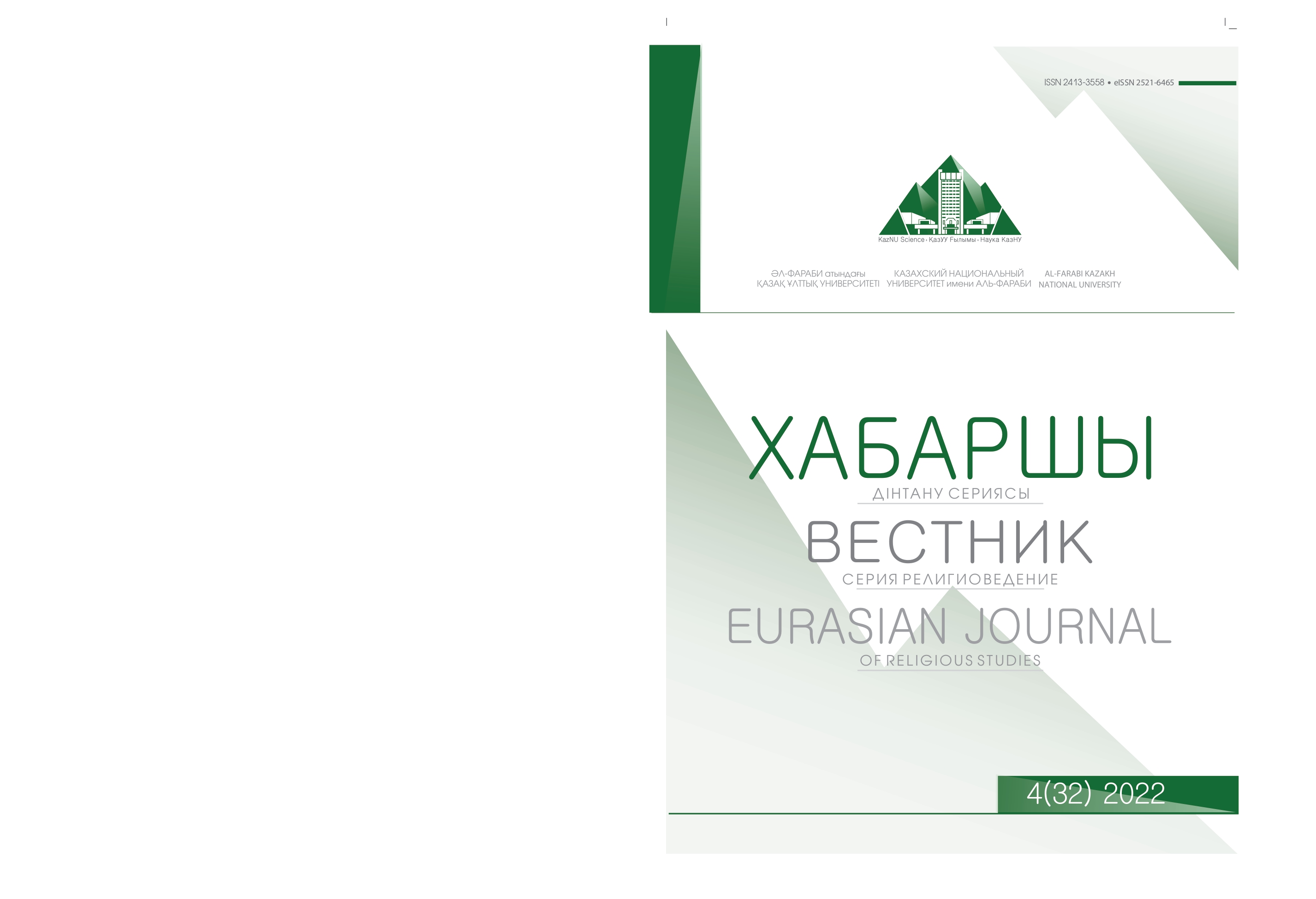Діни философиядағы мейірбан және кемел адам түсінігі
DOI:
https://doi.org/10.26577//EJRS.2022.v32.i4.r5Кілттік сөздер:
мейірбан адам, кемел адам, болмыс, адамгершілік, сопылықАннотация
Мейірбан және кемел адамды қалыптастыру қоғамдық дамудың арқауы болып табылады. Мейірбандылық пен кемелдік идеялары адамзат дамуымен бірге тарихи түрде дамыды. Қазіргі жаһандық процестер, құндылықтар құлдыраған заманда діни философиядағы мейірбан және кемел адам түсінігін қарастыру өзектілігін жоғалтпайды. Берілген мақаланың мақсатына діни философиядағы мейірбан және кемел адамның мәні мен маңызды сипаттарын ашып көрсету жатады. Бұл мақала осы ұғымдардан туындаған сұрақтарды зерттеген көптеген ғалымдардың тұжырымдарына негізделген. Мақалада мейірбан және кемел адам идеясын теориялық тұрғыдан түсінудің маңыздылығы қарастырылады. Біз осы тақырыптардың әрқайсысына кезекпен тоқталамыз. Ең алдымен мейірбан адам белгілері және түсінікті анықтаудағы конфуцийшілдіктің рөлін айқындаймыз. Зерттеу мейірбан адамның дербес, өнегелі, бірегей тұлға болуы керектігін көрсетті. Кейін кемел адамның негізгі белгілері анықталады. Кемел адамның үлгілі, идеалдылығымен ерекшеленетіндігі айқындалды. Салыстырмалы талдау ғылыми әдебиеттерге шолу жасау және нәтижелерді алу үшін қолданылды. Контент-талдау, жүйелік және тарихи зерттеу әдістеріне назар аудару үшін сипаттамалық әдіс қолданылды. Мақала авторлары мейірбан адам мен кемел адам түсініктері арасында айырмашылықтар бар деген қорытындыға келді.
Түйін сөздер: мейірбан адам, кемел адам, болмыс, адамгершілік, сопылық.
Библиографиялық сілтемелер
Ahmad, S.N. (2014) “Between spiritual authority and temporal power: Ibn Khaldun’s views on Sufism.” Al-Shajarah, 19(1), 55-84.
Ahn, H. (2008) “Junzi as a tragic person: A self psychological interpretation of the analects.” Pastoral Psychology, 57(1-2), 101-113.
Aminzadeh, S. (2014) “Study of perfect man in Sanai’s Masnawis.” Advances in Environmental Biology, 8(11 SPEC. ISSUE 5), 249-252.
Bartkus, R. (2021) “Joking: Wit or ridicule?” Logos-Vilnius, 107, 64-73.
Birkvad, S. (2015) “The fall of perfect man.” Short Film Studies, 5(2), 145-148.
Boros, G. (2009) “Molière, descartes, générosité.” Filozofia, 64(2), 133-143.
Cynarski, W.J. (2016) “A Christian and the martial arts path.” Ido Movement for Culture, 16(2), 1-7.
Dar, B.A. (2011) “Iqbal and Nietzsche’s concept of eternal recurrence.” Intellectual Discourse, 19(2), 281-305.
Hung, R. (2016) “A critique of Confucian learning: On learners and knowledge.” Educational Philosophy and Theory, 48(1), 85-96.
Khalilova, N.I, Bafayev, M.M, Oribboyeva, D.D., & Alimjan Kizi, T.G. (2020) “Eastern thinkers about the phenomena of self-awareness.” Journal of Critical Reviews, 7(2), 254-256.
Kim, H.P. (2006) “Confucius’s aesthetic concept of noble man: Beyond moralism.” Asian Philosophy, 16(2), 111-121.
Landsman, T. (1968) Positive experience and the beautiful person. – Charleston: Southeastern Psychological Association. – 28 p.
Landsman, T., & Landsman, M.S. (1991) “The beautiful and noble person - an existentialist-phenomenological view of optimal human functioning.” Journal of Social Behavior and Personality, 6(5), 61-74.
Mackey, S. (2012) “Semiotic, rhetoric and democracy.” Cosmos and History, 8(1), 304-322.
Molotova, G.M., & Molotova, E.M. (2020) “The concept of “insan-i kamil” in the teaching of Sufi.” Voprosy Istorii, 2020(10-4), 206-215.
Moradi, H. (2015) “The ethics of the perfect man: Maurice Blanchot and Ibn ͑Arabi.” Journal of Shi’a Islamic Studies, 8(1), 61-80.
Nelson, E.S. (2013) “The question of resentment in Nietzsche and Confucian ethics.” Taiwan Journal of East Asian Studies, 10(1), 17-51.
Olmsted, W. (2013) “Ethical deliberation in Aristotle’s rhetoric and Nicomachean ethics.” Polis (United Kingdom), 30(2), 251-273.
Omelchuk, R.K. (2013) “Religious and political philosophy of the social education in Ancient China.” Journal of Siberian Federal University. Humanities & Social Sciences, 6(3), 357-368.
Özkan, F.H. (2011) “Four paths forty posts in collected poems of Eşrefoǧlu Rûmî.” Turk Kulturu ve Haci Bektas Veli - Arastirma Dergisi, 59, 253-278.
Shukurov, S. (2019) “The perfect man - From metaanthropology to Homo socialis.” Istoriya, 10(4).
Snell, R.S., Wu, C.X., & Lei, H.W. (2022) “Junzi virtues: a Confucian foundation for harmony within organizations.” Asian Journal of Business Ethics, 11(1), 183-226.
Sobel, J.H. (2017) “The need for coercion.” In Coercion, edited by J.R. Pennock and J.W. Chapman. - New York: Routledge. - 340 р.
Sumanta (2021) “The values of perfect human beings in the dignity seven of Insān Kāmil.” Journal of Social Studies Education Research, 12(4), 286-301.
Tan, C. (2012) “Our shared values” in Singapore: A Confucian perspective.” Educational Theory, 62(4), 449-463.
Tian, V.-I., Tang, F., & Tse, A.C.B. (2022) “Understanding corporate culture and business performance from a Confucian perspective.” Asia Pacific Journal of Marketing and Logistics, 34(4), 759-777.
Turan, A.Z. (2013) “Design as enclosure: Draft of a phenomenology of artifice.” Technoetic Arts, 11(2), 173-183.
Zhaparova, A.Z., Dadebaev, Z., & Zhaksylykov, A. (2016) “The conceptual metaphor in Abay Kunanbayev’s poetics.” Journal of Language and Literature, 7(3), 54-59.













